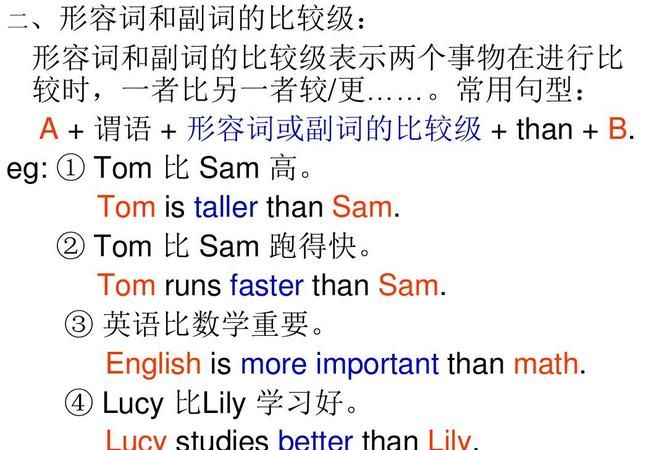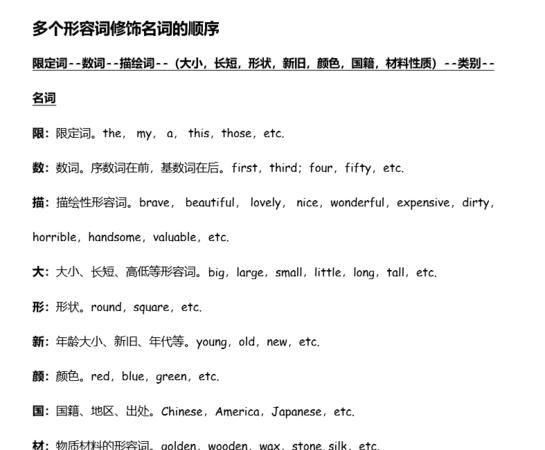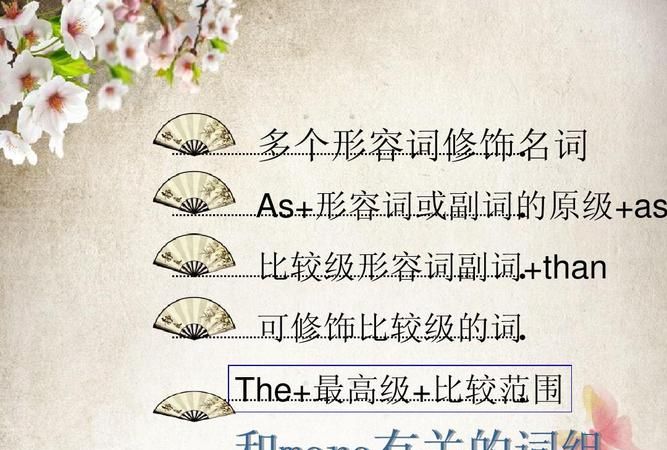本文目录
初中英语形容词比较级和最高级用法课件
初一英语知识点整理:形容词比较级和最高级的用法
形容词是修饰名词、表示名词属性的词。学习形容词,很重要的一部分内容就是形容词的比较级、最高级。关于它们的构成,之前已经有所归纳,请看形容词比较级的构成方法。

上一次我们讲了形容词原级的用法,今天就来说说比较级和最高级吧~
形容词比较级的'用法
一、在"...than..."句中:
HeistallerthanI.(口语中常作:Heistallerthanme.)
他比我高。
HeistwoheadstallerthanI.
他比我高出两个头。
二、在"which...,...or...?"句中,表示两者比较:
Whichisbigger,thesunorthemoon?
太阳和月亮,哪一个更大?
三、比较级+and+比较级:
It'sgettingdarkeranddarker.
天越来越黑了。
Heisgettingmoreandmoreinterestedinsports.
他对体育越来越感兴趣。
四、Themore...,themore...:
Themoreyoueat,themoreyouwant.
你越吃越想要。
五、形容词比较级前可受much,far,alot,still,no,alittle,even,any修饰,表示超出的程度:
Wehaveamuchbetterlifenow.
我们现在的日子好得多了。
ThebuildingslookfaruglierinLondonthanhere.
伦敦的建筑比这儿的难看得多。
Thisstoryisevenmoreinterestingthanthatone.
这个故事比那个更有趣。
Imadealotmoremistakesthanyou(did).
我犯的错误比你多多了。
Yourcakeisalittlelargerthanmine.
你的蛋糕比我的大一点儿。
It'sstillcoldertoday.
今天更冷一些。
-Haveyouanymore?-Oh,sorry,nomore.
-你还有吗?-哦,对不起,没有了。
She'snobetteryet.
她一点也没好转。
;初中英语形容词用法总结
形容词是说明人或事物的属性、状态或特征的词,在句子中主要作名词的装饰语。形容词通常置于其修饰的名词之前,并且多数形容词具有比较等级。下面是我为大家收集的初中英语形容词用法大全,供大家参考借鉴,希望可以帮助到有需要的朋友。
⑴ whole与all:记住两个词序:① the whole + 名词; ②all (of) the + 名词。如:He was busy the whole morning.(整个早晨他都很忙) / He can remember all the words he learns.(他能记住学过的所有单词)
⑵ tall与high, short与low:指人的个子时用tall与short;指其他事物时一般用high与low。如:He’s very tall/short.(他个子高/矮) / Tall trees are standing on both sides of that avenue.(大道的两侧有高大的树木) / A few people live on high mountains.(少量的人住在高山上)
⑶ real与true:real一般指东西的真假,译为“真的”;而true则指事情或消息的'可靠性,译为“真实的”。如:This is a real diamond(钻石) and it’s very expensive.(这是货真价实的钻石,非常贵) / --Is that true?—Yes. I heard it with my own ears.(那真实吗? 是的,我亲耳所听)
⑷ interested与interesting的区别:interesting指人或东西“有趣的”,作定语或表语,而interested则表示人对别的事物“感兴趣的”,只能作表语。如:The man is very interesting and all the children like him. (这个人很有趣,孩子们都喜欢他)/ This book is interesting and you can really enjoy yourself.(这本书很有趣,你会真正获得享受) / I am interested in science.(我对自然科学感兴趣)
⑸ such用法: such + a(n) + 名词(单数)(+that从句)。如:I have never seen such a foolish(愚蠢的) boy.(我从来没有见过这么蠢的男孩) / He had such a terrible accident that he could never forget it.(他遭遇了这么可怕的事故,他永远也不会忘记)
⑹ good与well:表示“好”时,作定语或表语用good,作状语用well;表示“(身体)好”时用well.如:Doing sports is good for us.(进行运动对我们有益) / Study well and make progress every day.(好好学习,天天向上) / --How are you?—I am very well.(你好吗?我很好。)
⑺ nice与fine:的区别:nice表示令人愉快的,可以指东西、人物外表等;fine一般指身体或天气好。如:Let’s go and share(分享) the nice cake.(我们去分享那块美味的蛋糕吧) / She is a nice girl.(他是个漂亮的姑娘) / What a fine day!(多好的天气!) /He’s fine recently(最近).(近来他身体不错)

英语语法中形容词的用法
一、形容词(组)用作状语,常常表示伴随情况.可以放在句首,也可放在句末.例如:
1.Over joyed,they rushed to the front. ——他们非常高兴,急忙跑到前面.
2.The thief hid himsel finthe corner,afraid of being caught.——小偷躲在角落里,担心被人抓住.
二、形容词(组)用作原因状语,通常位于句首.例如:
1.As he was thirsty and eager to get a little rest,he went into the tea house and seated himself at a little table by the window.
由于口渴,又渴望休息片刻,他就走进茶馆,在靠窗的一张小桌旁坐下.
2.Easy to be with,he is warmly welcomed.——因为平易近人,所以他受到热烈欢迎.
三、形容词(组)用作结果状语,一般位于句末.例如:
1.They broke into the uncle’s bedroom and found the man lying on the floor,dead.
他们强行冲进叔叔的卧室,发现那个人躺在地板上,已经死了.
2.He returned from war,safe and sound.——他安然无恙地从战争中归来.
四、形容词(组)用作评注性状语,表示说话人的看法、态度和评价.通常位于句首,常用逗号与句子隔开.例如:
1.Even more important,he is in charge of the project.——更重要的是,他负责这项工程.
2.Curious,the game should turn out that way.——真奇怪,比赛结果是那样的.
五、形容词(组)用作让步状语,常由一个形容词短语或or连接的两个以上的并列形容词短语构成.常常位于句首也可位于句中.例如:
1. Old or young, the peasants are busy with autumn harvest.——农民不论老少都在忙于秋收.
2. Every nation, big or small, should be equal.——每个国家无论大小,都应一律平等.
3. Right or wrong, I’ll stand on your side.——无论对还是错,我都将站在你的一边.
六、形容词(组)还可以用作时间状语.例如:
1.Glad, I sing an English song. (=When I am glad, I sing an English song.)
我高兴的时候,就唱一首英语歌.
2.We don’t eat vegertables raw. (=When vegetables are raw, we don’t eat them.)
我们不吃生蔬菜.

英语中形容词的用法及位置
1、 形容词作定语修饰名词时,要放在名词的前面。
但是如果形容词修饰something, anything, nothing等时,要放在这些词之后。例如:
This is a really beautiful necklace.
这真是一条漂亮的项链。
Jenny, I have something nice to show you.
詹妮,我有件好东西要给你看。
Is there anything else that I can do for you?
还有什么需要我帮忙的吗?
I was quite awake all the night.
我整整一夜都醒着。
Someone unfamiliar called me just now.
刚才有个不熟悉的人给我打电话。
2、 以-ly结尾的形容词
(1)、以-ly结尾的词多为副词。但friendly, deadly, lovely, lonely, likely, lively, ugly, brotherly, 仍为形容词。
(2)、有些以-ly结尾的词既为形容词,也为副词。例如:
daily, weekly, monthly, yearly, early
Times is a daily newspaper. And it is published daily.
3、 用形容词表示类别和整体
(1)、某些形容词加上定冠词可以泛指一类人,与谓语动词的复数连用。例如:the dead, the living, the rich, the poor, the blind, the hungry.
The poor are losing hope.
穷人们逐渐失去了希望。
形容词修饰名词,说明事物或人的性质或特征。通常可将形容词分成性质形容词和叙述形容词两类,其位置不一定都放在名词前面。
①、直接说明事物的性质或特征的'形容词是性质形容词,它有级的变化,可以用程度副词修饰,在句中可作定语、表语和补语。例如:hot热的, tense紧张的。
②、叙述形容词只能作表语,所以又称为表语形容词。这类形容词没有级的变化,也不可以用程度副词修饰。大多数以a开头的形容词都属于这一类。例如:afraid害怕的。
(√)The man is ill.
(×)She is an afraid girl.
(√)The girl is afraid.
这类词还有:well, unwell, alike, alive, alone, asleep, awake等。
(2)、有关国家和民族的形容词加上定冠词指这个国家的人或民族的整体,与动词的复数连用。例如:the British, the English, the French, the Chinese.
The English have a wonderful sense of humor.
英国人有一种很好的幽默感。

以上就是关于形容词的用法英语初一 ,初中英语形容词比较级和最高级用法课件的全部内容,以及形容词的用法英语初一 的相关内容,希望能够帮到您。

